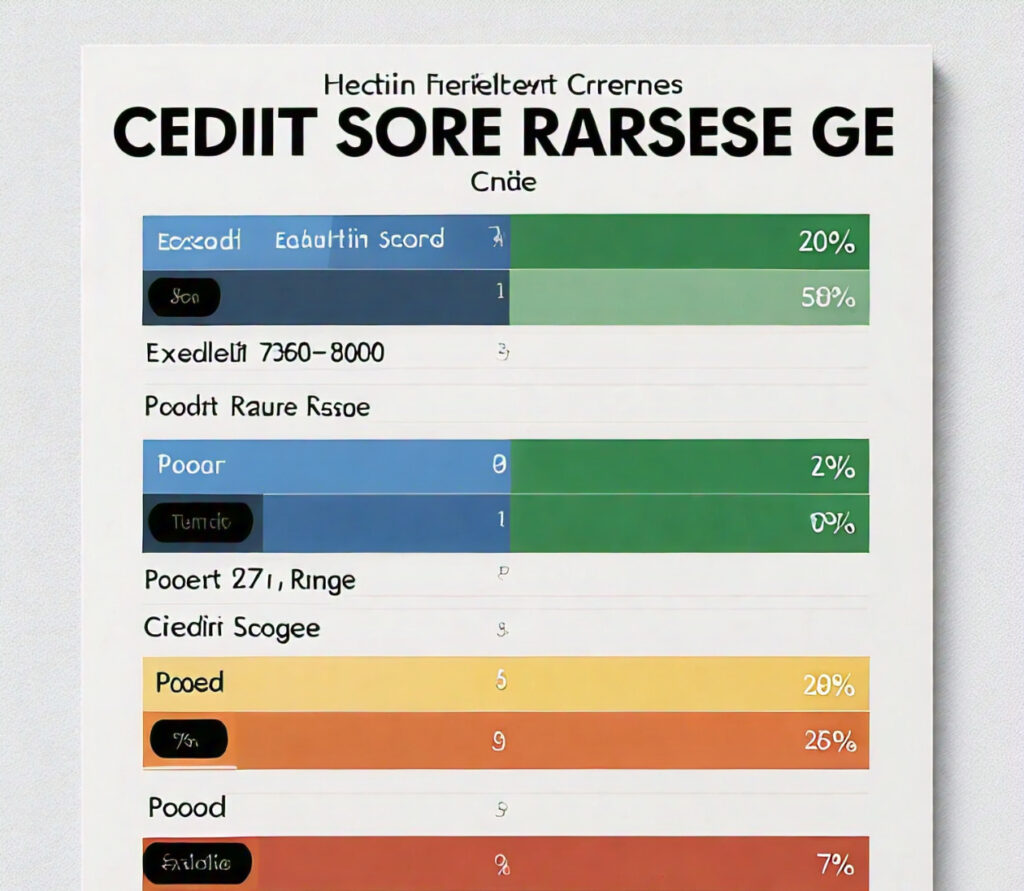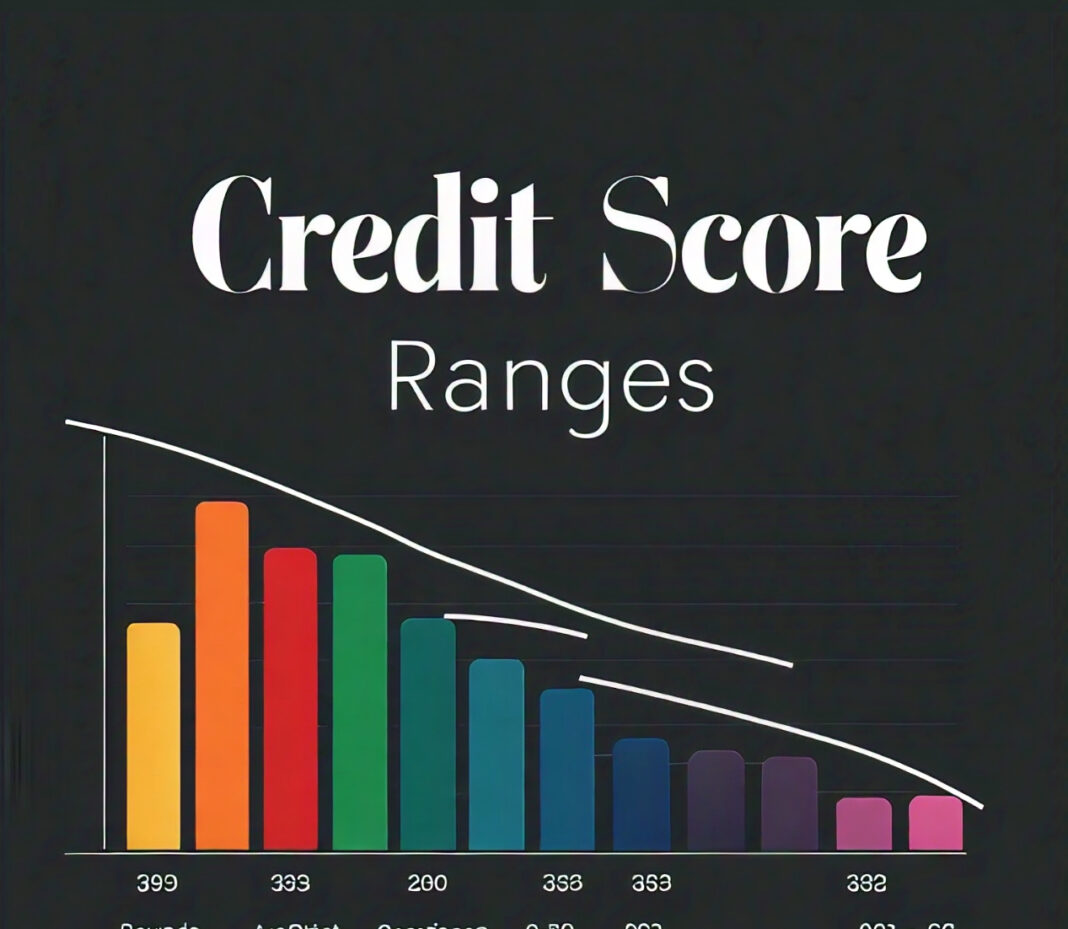In today’s financial world, your credit score is more than just a number—it’s a key that can unlock numerous opportunities or create significant obstacles in your financial journey. Whether you’re applying for a mortgage, seeking a new credit card, or even looking for a job, your credit score plays a crucial role in determining the outcome. But what exactly do these numbers mean? How are they calculated, and why do they matter so much?

This comprehensive guide will delve into the intricacies of credit score ranges, helping you understand where you stand and how your score impacts your financial life. We’ll explore the different credit scoring models, break down each range, and provide practical advice on improving and maintaining a healthy credit score.
What is a Credit Score?
Before we dive into the specifics of credit score ranges, it’s essential to understand what a credit score is and how it’s determined.
A credit score is a three-digit number that represents your creditworthiness. It’s calculated using complex algorithms that analyze your credit history, including factors such as:
- Payment history
- Credit utilization
- Length of credit history
- Types of credit accounts
- Recent credit inquiries
Lenders, landlords, and sometimes even employers use this score to assess the risk of doing business with you. A higher score indicates lower risk, often leading to better terms and opportunities.
Major Credit Scoring Models
While there are several credit scoring models in use today, two stand out as the most widely recognized and used:
FICO Score
Developed by the Fair Isaac Corporation, the FICO score is the most commonly used credit scoring model. FICO scores range from 300 to 850, with higher scores indicating better creditworthiness.
VantageScore
VantageScore is another popular model created by the three major credit bureaus (Equifax, Experian, and TransUnion). The latest versions (VantageScore 3.0 and 4.0) also use a range of 300 to 850, aligning with the FICO scale for easier comparison.
While these models use similar data to calculate scores, they may weigh factors differently, resulting in slightly different scores for the same individual.
Breaking Down Credit Score Ranges
Now that we understand what credit scores are and who calculates them, let’s break down the different credit score ranges and what they mean for your financial health.
Excellent Credit: 800-850
If your credit score falls within this range, congratulations! You’re in the top tier of credit scores.
What it means:
- You have a long history of on-time payments
- You use credit responsibly, keeping low balances on your credit cards
- You have a diverse mix of credit types
- You rarely apply for new credit
Benefits:
- Access to the best interest rates on loans and credit cards
- Higher credit limits
- More negotiating power with lenders
- Easier approval for premium credit cards and loans
How to maintain:
- Continue your excellent credit habits
- Monitor your credit report regularly for errors or fraud
- Be cautious about opening new accounts, as this can temporarily lower your score
Very Good Credit: 740-799
A score in this range is still considered excellent by most lenders.
What it means:
- You have a strong credit history with few if any, late payments
- You use credit responsibly, typically keeping low balances
- You have a good mix of credit types
Benefits:
- Access to very competitive interest rates
- High likelihood of loan and credit card approval
- Good negotiating power with lenders
How to improve:
- Pay down any existing credit card balances
- Continue to make all payments on time
- Avoid applying for new credit unless necessary
Good Credit: 670-739
This range is considered good and is around or slightly above the average credit score.
What it means:
- You have a solid credit history, though there may be a few late payments
- You use credit regularly but may carry higher balances than those in higher ranges
- You have a decent mix of credit types
Benefits:
- Approval for most credit cards and loans
- Competitive, though not the best, interest rates
- Reasonable credit limits
How to improve:
- Focus on paying down credit card balances
- Ensure all payments are made on time
- Consider diversifying your credit mix if it’s limited
Fair Credit: 580-669
A fair credit score suggests you’ve struggled with credit management.
What it means:
- You may have a history of late payments or high credit utilization
- You might have a limited credit history
- You may have had to apply for credit frequently
Implications:
- Higher interest rates on loans and credit cards
- Lower credit limits
- Possible difficulty in obtaining certain types of credit
How to improve:
- Make all payments on time every time
- Work on paying down existing debt, especially credit card balances
- Avoid applying for new credit unless absolutely necessary
- Consider a secured credit card to help build your credit
Poor Credit: 300-579
A score in this range indicates significant credit challenges.
What it means:
- You likely have a history of late or missed payments
- You may have accounts in collections or a bankruptcy on your record
- You might be using a large percentage of your available credit
Implications:
- Difficulty obtaining new credit
- Very high interest rates if approved for credit
- May need to provide a deposit or collateral for credit accounts
How to improve:
- Focus on making all payments on time
- Work with creditors to set up payment plans for any overdue accounts
- Consider a secured credit card to start rebuilding your credit
- Be patient – improving from this range takes time, but it’s possible
Factors That Influence Your Credit Score
Understanding what goes into your credit score can help you make informed decisions about your financial behavior. Here are the key factors that influence your score:
1. Payment History (35% of FICO Score)
This is the most crucial factor in your credit score. It looks at whether you’ve paid past credit accounts on time.
Tips to improve:
- Set up automatic payments or reminders to ensure you never miss a due date
- If you’re struggling to make payments, contact your creditors to discuss options
2. Credit Utilization (30% of FICO Score)
This refers to how much of your available credit you use at any given time.
Tips to improve:
- Aim to keep your credit utilization below 30% on each card and overall
- Consider making multiple payments throughout the month to keep balances low
3. Length of Credit History (15% of FICO Score)
This factor considers how long you’ve been using credit.
Tips to improve:
- Keep old accounts open, even if you’re not using them regularly
- If you’re new to credit, be patient – this factor improves with time
4. Credit Mix (10% of FICO Score)
This looks at your various credit accounts, including credit cards, retail accounts, installment loans, and mortgages.
Tips to improve:
- Don’t open accounts you don’t need just to have a mix
- If you only have credit cards, consider a small personal loan or a credit-builder loan
5. New Credit (10% of FICO Score)
This factor considers how many new accounts you’ve opened recently and how many hard inquiries are on your report.
Tips to improve:
- Avoid applying for new credit too often
- When shopping for a loan, do so within a short time frame to minimize the impact of multiple inquiries
The Impact of Credit Score Ranges on Your Financial Life
Your credit score range can affect various aspects of your financial life:
Loan Approval and Interest Rates
A higher credit score typically means easier loan approval and lower interest rates. This can save you thousands of dollars over the life of a loan.
Example: On a $200,000 30-year mortgage:
- Excellent credit (760-850): 3.307% APR
- Good credit (700-759): 3.525% APR
- Fair credit (680-699): 3.708% APR
- Poor credit (620-639): 4.816% APR
The difference between excellent and poor credit could cost over $60,000 over the life of the loan.
Credit Card Offers
Your credit score range determines the types of credit card offers you receive. Those with higher scores may qualify for cards with:
- Lower interest rates
- Higher credit limits
- Better rewards programs
- Sign-up bonuses
Insurance Premiums
In many states, insurance companies use credit-based insurance scores to help determine auto, home, and renters insurance premiums. A higher credit score could lead to lower premiums.
Rental Applications
Landlords often check credit scores when evaluating rental applications. A higher score can make getting approved for an apartment easier and might even help you negotiate better terms.
Employment
While less common, some employers may check credit reports (not scores) as part of the hiring process, especially for positions involving financial responsibilities.
How to Check Your Credit Score
Knowing your credit score is the first step in understanding where you stand and what you need to do to improve. Here are some ways to check your score:
- Credit Card Issuers: Many credit card companies now provide free credit scores to their customers.
- Credit Scoring Websites: Sites like Credit Karma, Credit Sesame, and NerdWallet offer free credit scores and monitoring.
- Credit Bureaus: You can purchase your FICO score directly from myFICO.com or get your VantageScore from each of the three major credit bureaus.
- Non-Profit Credit Counselors: These organizations can often provide you with a free credit score and advice on improving it.
Remember, the score you see may not be the exact score a lender uses, but it should give you a good idea of where you stand.
Strategies for Improving Your Credit Score
Regardless of your credit score, there’s always room for improvement. Here are some strategies to boost your score:
1. Pay Your Bills on Time
Set up automatic payments or reminders to ensure you never miss a due date. This is the single most important factor in your credit score.
2. Reduce Your Credit Utilization
Pay down your credit card balances and try to keep your utilization below 30%. If possible, make multiple payments throughout the month to keep balances low.
3. Don’t Close Old Accounts
The length of your credit history matters. Keep old accounts open, even if you’re not using them regularly.
4. Limit New Credit Applications
Each time you apply for credit, it can cause a small, temporary dip in your score. Only apply for new credit when necessary.
5. Use a Mix of Credit Types
If you only have credit cards, consider adding an installment loan to your credit mix. A credit-builder loan can be a good option if you’re trying to establish credit.
6. Check Your Credit Report Regularly
Review your credit report for errors and dispute any inaccuracies you find. You’re entitled to one annual free credit report from each bureau through AnnualCreditReport.com.
7. Consider a Secured Credit Card
A secured credit card can help you build or rebuild your credit history if you struggle to qualify for traditional credit.
8. Be Patient
Improving your credit score takes time. Focus on consistently practicing good credit habits, and you’ll see improvement over time.
Common Credit Score Myths Debunked
There are many misconceptions about credit scores. Let’s clear up some common myths:
Myth 1: Checking Your Own Credit Hurts Your Score
Truth: Checking your own credit is considered a “soft inquiry” and doesn’t affect your score. Only “hard inquiries” from lenders when you apply for credit can impact your score.
Myth 2: You Only Have One Credit Score
Truth: You have multiple credit scores. Different scoring models and even different versions of the same model can produce varying scores.
Myth 3: Closing a Credit Card Always Helps Your Score
Truth: Closing a credit card can hurt your score by increasing your credit utilization ratio and potentially shortening your credit history.
Myth 4: You Need to Carry a Balance to Build Credit
Truth: You don’t need to carry a balance or pay interest to build credit. Using your credit card and paying the full balance each month is sufficient.
Myth 5: Your Income Affects Your Credit Score
Truth: While income is important to lenders, it’s not a factor in your credit score. Your score is based on how you manage credit, not how much you earn.
The Future of Credit Scoring
As technology evolves, so do credit scoring models. Here are some trends to watch:
1. Alternative Data
Newer models incorporate alternative data such as rent payments, utility bills, and social media activity to provide a more holistic view of creditworthiness.
2. Artificial Intelligence and Machine Learning
These technologies are being used to develop more sophisticated credit scoring models to analyze vast amounts of data more quickly and accurately.
3. Real-Time Credit Scoring
Future models may provide real-time credit scores that update continuously based on your financial behavior.
4. Financial Inclusion
There’s a growing focus on developing models that can score “credit invisibles” – people with little to no traditional credit history.
Conclusion
Understanding credit score ranges is crucial in today’s financial landscape. Your credit score is more than just a number—it reflects your financial habits and is a key factor in many important life decisions. Whether you’re aiming to buy a home, finance a car, or simply improve your overall financial health, knowing where you stand and how to improve your score is invaluable.
Remember, no matter where your credit score currently falls, there’s always room for improvement. You can steadily climb the credit score ladder by practicing good credit habits consistently. Pay your bills on time, keep your credit utilization low, and be mindful of new credit applications. Regular check-ins on your credit report and score will help you stay on track and catch any issues early.
As credit scoring models continue to evolve, staying informed about changes in the industry can help you make better financial decisions. Remember that while your credit score is important, it’s just one piece of your overall financial picture. Combine good credit habits with sound budgeting, saving, and investing practices for a healthy financial life.
Your journey to excellent credit may take time, but the benefits – lower interest rates, better loan terms, and increased financial opportunities – make it well worth the effort. Start today, stay consistent, and watch as your financial opportunities expand along with your rising credit score.






